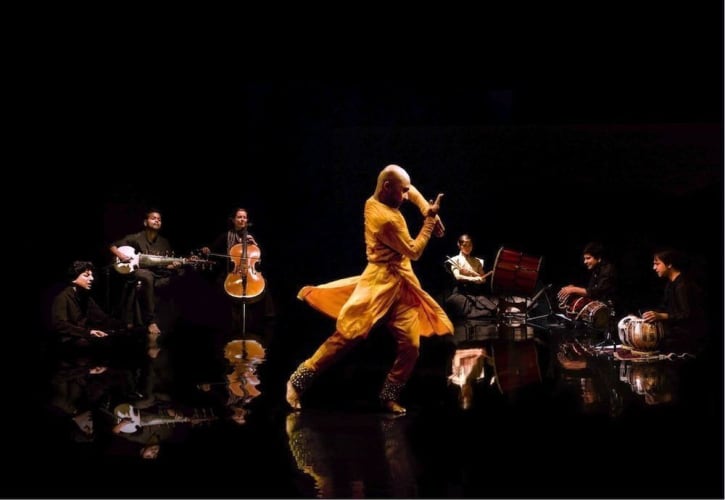Is Akram Khan’s Gnosis jinxed? In 2009, Khan fractured his shoulder, delaying the full production till the following year.
This year, the Edinburgh International Festival commissioned production, billed as the last chance to see the full Gnosis, with Fang-Yi Sheu guesting, disaster struck on the second night of only three performances. Fang-Yi Sheu was injured.
My bad luck to have chosen the second night? Yes and no. Of course, I’d have liked to have seen it all and the fabulous Fang-Yi Sheu, but Khan, ever the gentleman, decides to press ahead alone and not disappoint the audience. Disappoint he does not.
Turning disaster into triumph, as he did in 2009, Khan offers a truncated evening, sixty minutes without interval (instead of ninety-five with interval) of himself in fusion with his incredible band.
King’s Theatre was offering 20% discount on tickets (what a nightmare for them), but frankly it is unnecessary: the evening exceeds expectations. Khan in kathak solo and his musicians are worth every penny and more.
As in 2009, Khan performs the first half of the programme, Polaroid Feet, Tarana, and the 'improvised' Unplugged, followed by a very brief final self-immolation solo from Gnosis, in which, in gender role reversal, he plays Gandhari, blind prince Dhritarashtra's devoted wife, who blindfolds herself in order to share her husband's life in total.
Khan may be choreographing more and more contemporary dance pieces in interesting collaborations with other artists these days, but kathak informs every fibre of his body.
Studying this classical Indian discipline (and discipline is the word) since the age of seven with Pratap Pawar, to whom he dedicates this performance, in the maturity of years (forty last month) he is formidable.
Epic tales sung by Koushik Aithal to Sanju Sahai on tabla, Manjunath B Chandramouli on mridanga, Bernhard Schimpelsberger on percussion, Kartik Raghunathan on violin and Lucy Railton on cello, Khan is poetry in motion, ghunghru bells wound tight round his ankles.
Multiple beats, complex rhythms, fluid body interacting playfully, hands like lotus flowers, arms like water, feet that beat and root the rhythm.
As much a music concert as a dance piece, this is an evening that transcends description: at one with the music, Khan is a vivid storyteller. Eyes, mouth, muscles, cells, every part of him is the story.
A haze settles over the stage, Fabiana Piccioli’s dramatic lighting picks out the six seated musicians, three either side of the stage, hearts align to the music’s layered density, bells tinkle, and there he is in a shard of light.
Mercurial, within the music and in counterpoint to it, Khan is a being neither male nor female, just a body, a pure instrument dedicated to its mastery in miniscule detail, which isn’t acquired overnight.
Musical interludes punctuate, the lighting shifts, but the constant is Khan, celebrating his origins, the birth of creation and his own talent in shimmering cursive calligraphy: eloquent, dynamic, breathtaking / heart-stopping in its flow and tempo.
To complete the wonder that is Khan, he has 'a jam session' with his awesome musicians, their intricate mathematical beats creating patterns that he says are both scientific and spiritual, the stage his temple. In call and response this is a barnstorming session at improbable frequencies.
And then he gives us a demonstration of the closeness of kathak to flamenco, which he will explore in duet with Spanish flamenco dancer Israel Galván at Sadler’s Wells in November.
Finally, an essence of the ‘very dark’ Mahabharatan tale of Gandhari submitting her grief to fire, becoming the flame itself: molten, quaking in shuddering exorcism, the body returns to the elements, expressive of more than can be understood by the mind alone.
Gnosis means 'knowledge within'. Khan says it is about ‘experiencing darkness while being blind to light’. Blinded by his light, I can forgive him even in-i and iTMOi after this. I jest, of course. I genuflect to his talent and hard work: an enchanting enrapturing evening.
